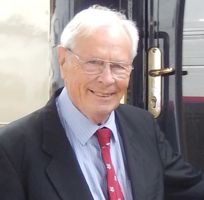
Ailsa's Blog: Meet Our Members: Colin
Compared with the other profiles of their musical journey on Ailsa’s blog, mine is very poor. During the War, my father was away most of the time; we lived in the village of Bucklebury (between Reading and Newbury) with my mother, her sister, their father and my brother. We had a wireless [radio to you] and a gramophone and a large selection of 78s, but I do not remember anything musical till after the war when we moved back to our house in Purley which had been commandeered by the army. I just remember “Uncle Mac” on the wireless and the classical music on the gramophone. In particular I remember the spirituals sung by Paul Robeson.
My mother used to put on productions at church, both in wartime and later. As a small boy I well remember hiding in the choirstalls and creeping out in the dark with a box for Pilate to stand on while Holst's 'Mars' was being played. There was other music played at such productions that I still remember when I hear them on Radio 3 - my car radio is always tuned to Radio 3.
My Father was particularly unmusical as was his younger brother. They were both trained as Licensed Readers in the Church of England but the trainers gave up trying to teach them to sing. He was able to quote long sections of the words from Gilbert and Sullivan. My elder brother joined the choir at Prep School and at Charterhouse but I was much too shy to join. I was given some piano lessons at prep school but as with so much of my schooling (I had a miserable time all through my school years) I was told to practise but never told how. By the time I got to Charterhouse I was already on the path to ministry in the Church of England and I did learn to sing plainsong from the plainsong notation for sung compline.
Then came National Service and I was posted to Germany. I bought a record player and joined a postal organisation that sent classical records each month and built up quite a collection of records. Then I started ordination training at King's College London. For the three years in London we had an hour a week with the organist teaching us how to sing the services. For our fourth year of training at St. Boniface College, Warminster, I learned to listen to the bass lines of some of the hymns and was able to sing bass.
Ordained in 1963, I served in various parishes for 40 years always singing the priestly parts of the services. At one stage for Choral Evensong, I did not require the organist to give me the note but would pitch it correctly. I think it was in my last parish that some keen members started a madrigal group and I was invited to join as a bass and for the first time learned to sing a bass line, though never taught to read music.
So, on retirement in the autumn of 2003, we bought a house in Seaford and moved here. Almost as soon as we were here, I joined the Choral Society once I saw that there would be no audition nor the need to read music. I still need to ask which notes in the music are a quaver or semi-quaver if it seems necessary to know. During lockdown I much enjoyed John's instructions on how to read music, but I fear I have not retained what I learned. By now I am certainly second bass, I struggle to reach our highest notes, but I have always managed all the bottom notes we have ever been asked to sing. I do join St Leonard's choir when the organist asks for an "augmented" choir.
Colin Part 2
Reflecting on his musical life for the Blog made Colin realise that pop music had completely passed him by except for two occasions.
In March 1957 a friend took him to the Davis Theatre in Croydon where he heard Bill Haley And The Comets perform Rock Around The Clock. The following year, training to be an Army officer, he hitchhiked to a cinema in Andover to watch Presley's Jailhouse Rock. In the subsequent forty years, despite being involved in running various youth groups with the requisite loud pop music, he trained himself not to hear it so he could talk to the young people and keep an eye on things!



